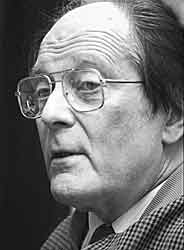Jaan Kross
| Jaan Kross | |
|---|---|

Jaan Kross in 1987, by Guenter Prust
|
|
| Born |
19 February 1920 Tallinn, Estonia |
| Died | 27 December 2007 (aged 87) |
| Nationality | Estonian |
| Alma mater | University of Tartu |
| Genre | novels |
Jaan Kross (19 February 1920 – 27 December 2007) was an Estonian writer.
Born in Tallinn, Estonia, son of a skilled metal-worker, Jaan Kross studied at Jakob Westholm Grammar School, and attended the University of Tartu (1938–1945) and graduated from its School of Law. He taught there as a lecturer until 1946, and again as Professor of Artes Liberales in 1998.
In 1940, when Kross was 20, the Soviet Union invaded and subsequently occupied the three Baltic countries: Estonia, Latvia and Lithuania, sending all their governments to Siberia. Then in 1941, the Nazi Germans invaded and took over the country, which formed a brief respite for many of the population (except, of course, Estonian Jews) but Estonians soon realised that the German Nazis were as bad as the Soviet Communists. These two powers had after all even had a short-lived truce, when they both signed the Molotov-Ribbentrop Pact. Hitler and Stalin divided up Eastern Europe in a secret protocol within this pact, and the Baltic countries became part of Stalin's share.
Kross was first arrested by the Germans for six months in 1944 during the German occupation of Estonia (1941–1944), suspected of what was termed "nationalism", i.e. promoting Estonian independence. Then, on 5 January 1946, when Estonia had once again become part of the Soviet Union, he was arrested by the Soviet occupation authorities who kept him a short while in the cellar of the NKVD headquarters, then kept him in prison in Tallinn, finally, in October 1947, deporting him to a Gulag camp in Vorkuta, Russia. He spent a total of eight years in this part of North Russia, six working in the mines at the labour camp in Inta, then doing easier jobs, plus two years still living as a deportee, but nevertheless not in a labour camp. Upon his return to Estonia in 1954 he became a professional writer, not least because his law studies during Estonian independence were now of no value whatsoever, as Soviet law held sway.
At first Kross wrote poetry, alluding to a number of contemporary phenomena under the guise of writing about historical figures. But he soon moved over to writing prose, a genre that was to become his principal one.
Kross was by far the most translated and nationally and internationally best-known Estonian writer. He was nominated several times for the Nobel Prize in Literature during the early 1990s, and was named a People's Writer of the Estonian SSR (1985); he received the State Prize of the Estonian SSR (1977). He also held several honorary doctorates and international decorations, including the highest Estonian order and one of the highest German orders. In 1999 he was awarded the Baltic Assembly Prize for Literature.
...
Wikipedia
